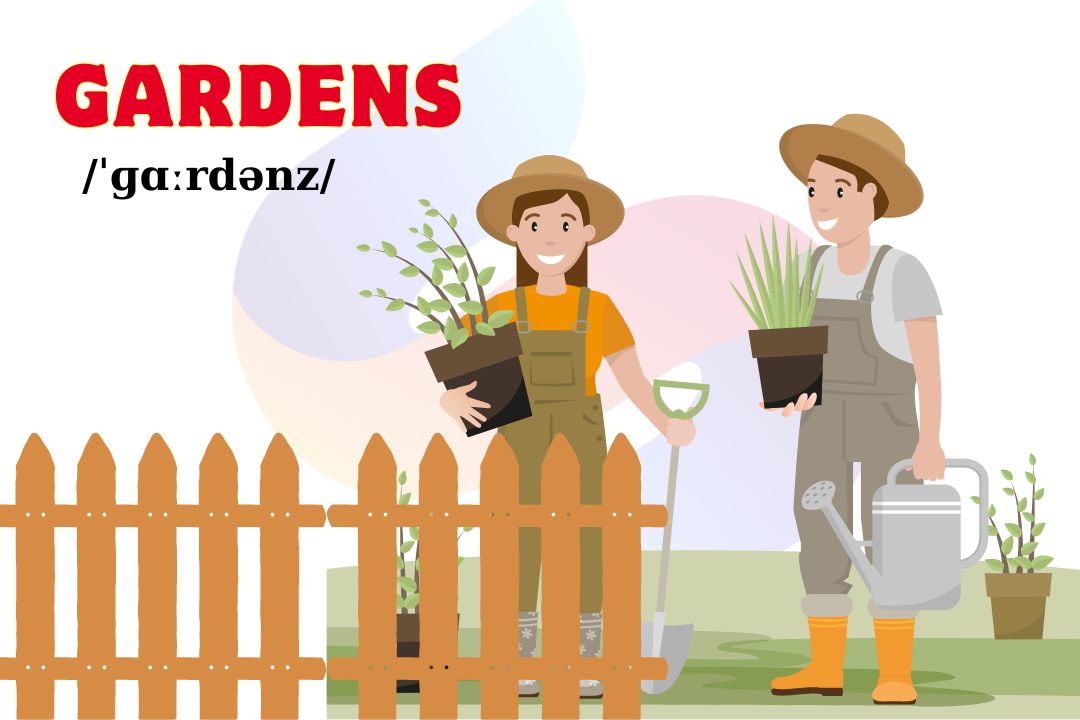Đội ngũ chuyên gia tại Smartcom English là tập hợp những chuyên gia đầu ngành trong lĩnh vực IELTS nói riêng và tiếng Anh nói chung. Với phương pháp giảng dạy sáng tạo, kết hợp với công nghệ AI, chúng tôi mang đến những trải nghiệm học tập độc đáo và hiệu quả. Mục tiêu lớn nhất của Smartcom Team là xây dựng một thế hệ trẻ tự tin, làm chủ ngôn ngữ và sẵn sàng vươn ra thế giới.
Trong IELTS Speaking Part 3, chủ đề “Gardens” có thể không phổ biến như các chủ đề khác, nhưng nếu xuất hiện, nó thường xoay quanh các khía cạnh văn hóa, môi trường, và xã hội liên quan đến việc duy trì và thiết kế các khu vườn. Đây là một chủ đề thú vị, kết hợp giữa khái niệm thiên nhiên, lối sống và tác động của con người lên môi trường.
● Do people in your country usually have gardens in their homes?
● Which age group visits gardens the most?
● Is it good for people to take care of a garden?
● Why do people grow their own plants at home sometimes?
● Is it common for people in your country to grow fruits and vegetables at home?

Do people in your country usually have gardens in their homes?
(Người dân ở nước bạn có thường có vườn trong nhà không?)
In my country, it’s not very common for people to have gardens in their homes, especially in urban areas. Most people live in apartments or small houses where there is limited space for gardening. For instance, in cities like Ho Chi Minh City, many residents live in high-rise buildings with no access to private outdoor spaces.
However, in rural areas or smaller towns, people are more likely to have gardens. They often grow vegetables or fruit trees as part of their daily life. This is not only for personal consumption but also as a way to save money and live more sustainably.
In summary, while urban residents typically don’t have gardens due to space limitations, those in the countryside are more likely to maintain gardens as part of their lifestyle.
Phân tích câu trả lời
- Bài nói bắt đầu bằng cách đưa ra nhận định chung về số lượng nhà có vườn. Tiếp theo, hai điểm tương phản được so sánh là thành thị và nông thôn kèm theo các ví dụ. Câu kết luận tóm tắt ngắn gọn tình hình chung, nhấn mạnh sự khác biệt giữa thành thị và nông thôn. Điều này đảm bảo câu trả lời ngắn gọn và được tổ chức tốt.
Từ vựng trong câu trả lời
- urban areas: khu vực thành thị
- high-rise buildings: những tòa nhà cao tầng
- private outdoor spaces: không gian riêng tư ngoài trời
- rural areas: khu vực nông thông
- personal consumption: tiêu thụ cá nhân
- sustainably: một cách bền vững
- space limitations: giới hạn không gian
Which age group visits gardens the most?
(Lứa tuổi nào đi thăm các khu vườn nhiều nhất?)
In my opinion, older adults tend to visit gardens the most. Many retirees or elderly people enjoy spending time in gardens for relaxation, exercise, and fresh air. For instance, it’s common to see seniors walking or practicing tai chi in parks and botanical gardens, especially in the mornings.
However, younger adults and families with children also visit gardens, but usually for specific activities like picnics or special events. While they do appreciate nature, their visits might be less frequent compared to older people, who see it as part of their routine.
In conclusion, though different age groups enjoy gardens, it’s the elderly who seem to visit them most regularly for both health and leisure purposes.
Phân tích câu trả lời
- Mở đầu: Xác định nhóm tuổi đến thăm vườn nhiều nhất.
- Nội dung: Giải thích lý do tại sao người lớn tuổi là khách thăm chính, kèm ví dụ. Sau đó cũng đề cập đến những người trẻ tuổi và gia đình, mang lại sự tương phản.
- Kết luận: Tóm tắt ngắn gọn ý kiến cho rằng người lớn tuổi đến thăm vườn thường xuyên nhất.
Từ vựng trong câu trả lời
- tend to: có xu hướng
- retirees: những người đã nghỉ hưu
- practicing tai chi: luyện tập thái cực quyền
- botanical gardens: vườn thực vật
- specific activities: hoạt động cụ thể
- less frequent compared to: ít thường xuyên hơn so với
- leisure purposes: mục đích giải trí
Is it good for people to take care of a garden?
(Việc mọi người chăm sóc một khu vườn có tốt không?)
Definitely! I believe that it’s very beneficial for people to take care of a garden. First, it provides physical exercise, as gardening activities like digging, planting, and watering involve movement. This can help people stay active, especially those who don’t engage in regular workouts.
Second, gardening has mental health benefits. It’s known to reduce stress and improve mood because spending time in nature has a calming effect. For example, people often find peace and satisfaction in seeing their plants grow and flourish.
In conclusion, taking care of a garden promotes both physical and mental well-being, making it a positive activity for anyone who has the opportunity.
Phân tích câu trả lời
- Giới thiệu: Tuyên bố rõ ràng ủng hộ lợi ích của việc làm vườn.
- Nội dung: Hai điểm chính—lợi ích sức khỏe thể chất và tinh thần—được củng cố bằng một ví dụ ngắn gọn.
- Kết luận: Tóm tắt lý do tại sao làm vườn lại tốt cho con người, đề cập đến cả khía cạnh thể chất và tinh thần.
Từ vựng trong câu trả lời
- beneficial for: có ích cho
- stay active: duy trì hoạt động
- engage in: tham gia vào
- regular workouts: các bài tập luyện thường xuyên
- calming effect: có tác dụng làm dịu
- flourish: phát triển mạnh mẽ
- physical and mental well-being: sức khỏe thể chất và tinh thần
Why do people grow their own plants at home sometimes?
(Tại sao đôi khi người ta lại tự trồng cây ở nhà?)
People grow their own plants at home for several reasons. Firstly, growing plants can be more economical, especially when it comes to herbs, vegetables, or fruits. For example, instead of buying fresh produce from the store, people can grow them at home, which saves money and provides a fresher, organic alternative.
Secondly, it’s a hobby that many people find enjoyable and relaxing. Gardening allows them to connect with nature and take a break from their busy lives. Some people also find satisfaction in nurturing plants and watching them grow.
In conclusion, people grow their own plants to save money, enjoy a rewarding hobby, and live a healthier, more sustainable lifestyle.
Phân tích câu trả lời
- Giới thiệu: Lý do chung tại sao người ta trồng cây ở nhà.
- Nội dung: Hai điểm chính—lợi ích kinh tế và sở thích làm vườn—kèm ví dụ.
- Kết luận: Tóm tắt những động lực chính để trồng cây tại nhà.
Từ vựng trong câu trả lời
- economical: tiết kiệm
- herbs: thảo mộc
- fresh produce: sản phẩm tươi sống
- organic alternative: sản phẩm hữu cơ thay thế
- to connect with nature: kết nối với thiên nhiên
- take a break: nghỉ ngơi
- nurturing plants: chăm sóc cây
- sustainable lifestyle: lối sống bền vững
Is it common for people in your country to grow fruits and vegetables at home?
(Người dân ở nước bạn có thường trồng trái cây và rau quả tại nhà không?)
Từ vựng trong câu trả lời
- are drawn to: bị thu hút bởi
- fresh, organic produce: sản phẩm tươi, hữu cơ
- reliable: đáng tin cậy
- store-bought options: đồ mua tại cửa hàng
- appealing: hấp dẫn
- sense of accomplishment: cảm giác thành tựu
- self-sufficiency: tự cung tự cấp
- gain traction: đạt được sức hút
- health-conscious: ý thức về sức khỏe
- cost-effective: tiết kiệm chi phí
Xem thêm:
IELTS Speaking part 3 topic: Outdoor Sports (Question & Sample answers)
Để có kết quả tốt trong phần IELTS Speaking Part 3 với chủ đề Gardens, bạn nên kết hợp hiểu biết của mình để trình bày về chủ đề cùng khả năng sử dụng ngôn ngữ một cách linh hoạt và kỹ năng giao tiếp hiệu quả. Hãy tự tin khi trình bày ý kiến của mình và thật tự tin trong khi thi. Chúc bạn đạt được thành công!
Bạn đang tự hỏi nên học IELTS ở đâu để được hướng dẫn đúng cách? Hay lo lắng về chi phí học IELTS sao cho hợp lý? Hãy đến Smartcom English – nơi hội tụ đội ngũ giảng viên bản ngữ và cựu du học sinh giàu kinh nghiệm sẽ giúp bạn đạt IELTS band cao.
Kết nối với mình qua
Bài viết khác


![[PDF + Audio] Tải Sách IELTS Cambridge 19 (Kèm đáp án)](https://smartcom.vn/blog/wp-content/uploads/2024/06/ielts-cambridge-19_optimized.png)


![[PDF + Audio] Tải Sách IELTS Cambridge 17 (Kèm đáp án)](https://smartcom.vn/blog/wp-content/uploads/2024/07/sach-ielts-cambridge-17_optimized.jpg)

![[PDF + Audio] Tải Sách IELTS Cambridge 15 (Kèm đáp án)](https://smartcom.vn/blog/wp-content/uploads/2024/07/ielts-cambridge-15_optimized.jpg)








